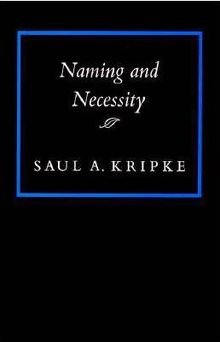Naming and Necessity
 |
|
| Author | Saul A. Kripke |
|---|---|
| Country | United States |
| Language | English |
| Subject | Philosophy, Metaphysics, Philosophy of language |
| Publisher | Harvard University Press, Blackwell |
|
Publication date
|
1980 |
| Media type | Print (Hardback and Paperback) |
| Pages | 184 |
| ISBN | |
| OCLC | 5726909 |
| 160 19 | |
| LC Class | BD417 .K74 |
Naming and Necessity is a 1980 book with the transcript of three lectures, given by philosopher Saul Kripke, at Princeton University in 1970, in which he dealt with the debates of proper nouns in the philosophy of language. The transcript was brought out originally in 1971 in The Semantics of Natural Language, edited by Donald Davidson and Gilbert Harman. Among analytic philosophers, Naming and Necessity is widely considered one of the most important philosophical works of the twentieth century.
Language is a primary concern of analytic philosophers, particularly the use of language to express concepts and to refer to individuals. In Naming and Necessity, Kripke considers several questions that are important within analytic philosophy:
Kripke's three lectures constitute an attack on descriptivist theories of proper names. Kripke attributes variants of descriptivist theories to Gottlob Frege, Bertrand Russell, Ludwig Wittgenstein and John Searle, among others. According to descriptivist theories, proper names either are synonymous with descriptions, or have their reference determined by virtue of the name's being associated with a description or cluster of descriptions that an object uniquely satisfies. Kripke rejects both these kinds of descriptivism. He gives several examples purporting to render descriptivism implausible as a theory of how names get their reference determined (e.g., surely Aristotle could have died at age two and so not satisfied any of the descriptions we associate with his name, and yet it would seem wrong to deny that he was Aristotle). As an alternative, Kripke adumbrated a causal theory of reference, according to which a name refers to an object by virtue of a causal connection with the object as mediated through communities of speakers. He points out that proper names, in contrast to most descriptions, are rigid designators: A proper name refers to the named object in every possible world in which the object exists, while most descriptions designate different objects in different possible worlds. For example, 'Nixon' refers to the same person in every possible world in which Nixon exists, while 'the person who won the United States presidential election of 1968' could refer to Nixon, Humphrey, or others in different possible worlds.
...
Wikipedia
